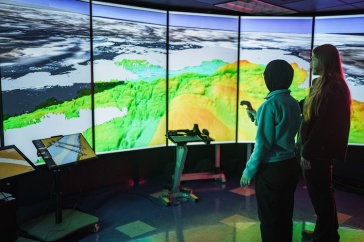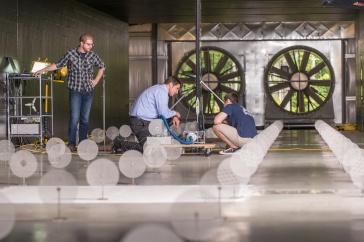John Berst is a big man with a big voice — the kind of voice any actor would envy for its ability to project to the back of the theater. To own a room.
And at this moment, John owns the room. In a city government meeting hall, he's railing on to the 25 or so people assembled about a proposal to install a drug treatment center in his neighborhood. "How can you even think of doing this?!" he shouts to the city officials seated at the front of the room. "There will be broken syringes everywhere and my kids will get cut and who knows what kind of diseases they'll be exposed to?"
Nobody is inclined to reply. John gets louder and angrier and you can sense the fear he has created.
Then, a much quieter voice — almost a whisper — comes from another source: "Pause." John quiets and the tension drains out of the room.
The "pause" command comes from David Kaye, a professor in the UNH Theater Department. Berst is also an assistant professor in that department, and this has been a make-believe scenario created by Kaye, a group of actors, UNH Cooperative Extension, and New Hampshire Listens, a project of UNH's Carsey School of Public Policy.
The purpose: to help municipal leaders such as town selectmen and zoning chairs facilitate the often difficult dynamics that come up in meetings, dynamics that can derail progress and stall productivity.
Known as the Facilitation Lab, this program seeks to "promote civility and productivity in public meetings," said Kaye. During the course of two hours, Kaye and his actors presented three common situations faced by community leaders — for example, poor meeting management by board leaders and intense emotionality from citizens — and invited about 15 real community leaders from towns and cities all over New Hampshire to watch the performances, and discuss, with the Facilitation Lab creators and each other, ways to improve their own performance in public meetings.
"In our work at Cooperative Extension, what we hear and observe is that leaders can be challenged by interactions among people at public meetings, and the lab format allows us to practice and try out different techniques and skills to manage those meetings," said Molly Donovan, a community and economic development specialist. "The lab part is very important because we get to experiment with what works and doesn't work in different situations."
The result is a dynamic, give-and-take experience featuring familiar and highly emotional situations, keen observations, and renewed confidence on the part of the real community leaders to be better facilitators back home.
The Facilitation Lab recognizes that, often, the worst behaviors can come from the people from whom we expect the best: the chairs and members of municipal boards. In the first scenario, a five-member planning board in a non-public meeting debated a new zoning rule that would change an historic farm to commercial zoning. In the scenario, one board member lobbied another before the meeting to support him in the zoning change. The chair let the meeting run out of control with a lack of rules ("Is there a motion on the table?" one member demanded. "It's not even clear if there is an active motion.") and few skills to keep other board members from taking over the conversation.
The participants acted out what Kaye calls "micro-aggressions," such as using a cell phone during a meeting. And deeply embedded human dynamics emerged, behaviors that, left unchecked, could result in unbalanced power and influence. Kaye calls these the "seeds that are being planted into something that can't be controlled."
For example, as the five actors played out their roles, gender politics began to emerge. While this can be subtle, Kaye questioned the "board members," in character, if they thought gender was playing a part in this situation. All of them said yes, some with surprising honesty. The real-life participants also noticed: one participant said that "some of the men were using their gender to bully the women."
| Want to Know More? | |
| For more information about the Facilitation Lab, contact Cooperative Extension community and economic development specialist Molly Donovan. Access a list of meeting facilitation best practices here. |
The character of John also suggested that some board members could not make reasoned choices because they had not lived in town long enough. "Here we do things differently," he said. "I've lived here for years, we know things," essentially saying that the newer members could not now, or perhaps ever, be capable of making a decision the town would support.
Further, when attempting to establish their credentials for representing the town, John claimed that he knew the family that had owned the historic farm and averred that they wanted this zoning change. However, when another board member said she had received many e-mails from Historical Society members against the zoning change, John dismissed her. "How do we know for sure if those emails are real? They could be fake."
In later discussion, participants got the chance to ask the actors, still in character, why they did what they did (or didn't do). "Why didn't you act?" posed one to the board chair. "I wanted to give everyone a chance to speak," the chair replied, suggesting that sometimes the best intentions can be overplayed and lead to difficulties. Putting the issue into perspective, David Kaye said, "A scrupulous chairperson can cripple himself with good intentions," but also pointed out that in this case, the chair did not have a vested interest in the issue, while the other members did.In the third and final scenario of the Facilitation Lab, an actor portrayed an irate parent challenging the inclusion of a certain book in the school's curriculum, believing it to be inappropriate for children. The two primary problems facing the meeting facilitators: curriculum decisions rest with the School Board, and this was a selectmen's meeting, and the woman would not stop her tirade, no matter what the meeting chair said or did.
Kaye invited the participants to suggest what they might do in this situation, and one agreed to "sit in" on the scenario as the chair. The scene was re-enacted, with the participant using a combination of understanding words, respect, and a suggestion that the parent continue to fight the issue with the School Board. This had the effect of taking the wind out of the sails of the woman whose actions were not productive, in the moment, for the board's agenda and a lessening of the tension in the room. The "board chair" also got an appreciative round of applause from everyone in the room for her courage and success in taking on the challenge.
Thel lab generated much useful discussion and observations like this from both sides of the scenarios: being mindful of how people in meetings choose to sit in relation to one another; staying aware of the facilitator's roles, strategies, and possible subversion of their authority; and maintaining respect for people at the meeting table and in the audience. "Tone is so important," said Michele Holt-Shannon of New Hampshire Listens. "Sometimes it has to get ugly so people can say their piece, but we have to say thank you and show respect."
Public meeting facilitation, added Kaye, "is the world of relationships and psychology. There are always things we can't control, but we're trying to keep the ship going forward."
The Facilitation Lab held in early February was the sixth of its kind for local community leaders in New Hampshire, with nearly 140 participants in total. The lab emerged from an already fruitful partnership between Cooperative Extension and New Hampshire Listens. In the lab and other projects, "NH Listens has been our partner and collaborator to bring best practices in civic engagement to the state," said Molly Donovan.
"When UNH theater professor David Kaye expressed interest in using applied theatre to address real world problems, especially as they relate to healthy democracies, we enthusiastically welcomed him, and the Facilitation Laboratory was born. The lab is another way we've come together to meet the needs of community leaders."
Community leaders at the local level have long been looking for ways to improve public meetings. The partnership addressed this by researching best meeting practices and holding focus groups with community leaders and planners to learn about their experiences and practices to develop the Lab sessions.
The research — and personal observations from many public sessions — strongly suggested that the role of the chair in effectively managing public meetings was key, and gave the project its focus. "We developed the content for the scenarios, gave feedback at rehearsals with actors, pointed them to useful resources like examples of public meetings on the web — everything we could do to make the scenarios realistic," Donovan said.
—C. Ralph Adler
-
Written By:
Michelle Morrissey ’97 | UNH Magazine | michelle.morrissey@unh.edu
















































